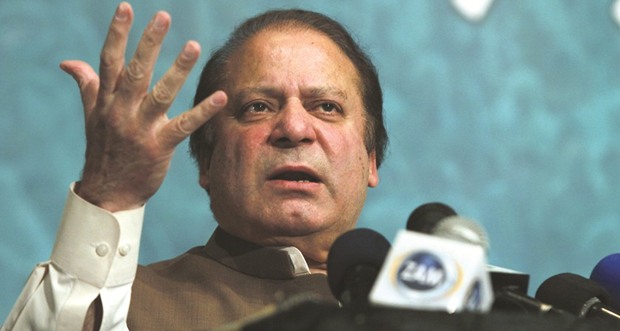More than one year after the Panama Papers scandal broke globally and nearly half a year since the Supreme Court of Pakistan took up issue to determine the bona fides of the assets and financial probity of Prime Minister Nawaz Sharif’s family, a verdict arrived last Thursday in a case that had long kept the country agog.
A split 3-2 judgement at the end of a marathon that saw two different benches under succeeding chief justices meant that Sharif had survived the biggest crisis of his political career, but may be only just.
After dissenting notes from two justices, who nevertheless went along with their three other brother judges in seeking a further investigation, the verdict could only be deemed as interim pending the result of the investigation. The apex court has ordered the PM and his two sons to appear before a Joint Investigation Team (JIT) with officials from National Accountability Bureau, Federal Investigation Agency, Security Exchange Commission of Pakistan, Inter-Services Intelligence and Military Intelligence. The team – to be formed within a week of the court order and led by an Assistant Director General-level officer from the FIA – is to report to the apex court every fortnight before the final report is submitted within 60 days.
The significance of the case is lost on no-one. Never before in the country’s history has a sitting chief executive been forced to come clean in full public glare under the direct supervision of the highest judicial forum although strictly speaking, the name of Prime Minister Sharif, himself, does not appear in the Panama Papers.
To his credit, Sharif did not seek legal immunity allowed to him under the constitution although critics maintain that would have been counterproductive.
The First Family denies any wrongdoing, but even after Sharif’s parliamentary appearance to explain the case and two nationally televised addresses, its attempts at proving the money trail failed to satisfy the bench.
The Supreme Court verdict follows months of intense political drama with teams from both the defendant Sharif camp and opposition Pakistan Tehrik-i-Insaf (PTI) of Imran Khan as the chief prosecution party locked in a bitter made-for-television battle of attrition.
Justice Asif Saeed Khan Khosa, who eventually wrote a dissenting note in the judgement, famously drove home at the Metro Train project case hearing a week earlier, that the court judgement (in Panama case) would be “quoted for 20 years”. Just a day ahead of the Panama ruling, Shahbaz Sharif, chief minister of the Punjab province and the PM’s younger brother, appeared to take a swipe at the judge, saying, “the PM’s (development) projects will be remembered for 40 years”!
Interestingly, Justice Khosa, who drew quite a bit of attention for his intuitive mien and sharp observations during the hearings, referenced Mario Puzo’s popular 1969 novel and, later iconic film, The Godfather, in his dissenting note! Both Khosa, who read out the Thursday verdict, and his fellow dissenting judge, Justice Gulzar Ahmed, are primed to assume the top adjudicator’s seat, one after the other, in the not-so-distant future – an eventuality that has drawn some mirth.
In the lead-up to the 540-page April 20 verdict – coming 57 days after the final hearing – it had pretty much boiled down to winners-take-all proposition, with a majority of supporters belonging to both Sharif’s ruling Pakistan Muslim League-Nawaz (PML-N) and Khan’s PTI giving to believe that it would upend one of the two leaders’ political future. In the end, both lived to tell the tale; neither completely winning nor losing, but that did not stop them or their rank and file from publicly celebrating the outcome last Thursday.
It is a measure of how high the stakes are that the ruling MPs, a number of whom were a regular presence at the hearings all along, quickly raised a toast, flashing V-signs and partaking sweets once the (interim) order allayed their worst fears of the PM’s disqualification that the petitioners had pleaded for.
However, before the day was done, it began to dawn on the ruling party – as well as the opposition and the shrill media, which had earlier indulged in frivolous conclusions – that the PM was not out of the woods yet, and that an inquiry had potential pitfalls for both Sharif and his party’s immediate and long-term prospects.
A special bench of the Supreme Court will also be constituted to examine the case. The court further said: “Upon receipt of the reports, periodic or final of the JIT, as the case may be, the matter of disqualification of respondent No. 1 [Nawaz Sharif] shall be considered. If found necessary for passing an appropriate order in this behalf, [Nawaz Sharif] or any other person may be summoned and examined.”
So what does the future portend for Sharif?
The operative part is that he stays as PM, for now, but the longevity of his third stint in office will not only depend strictly on the outcome of the JIT investigation feeding into the final Supreme Court verdict, but also how the political cards fall. Sensing blood, the opposition – which had until now been confined to the lonely, if undying, spirit of Imran Khan – is gathering steam with the ‘kingmaker’ Asif Zardari, former president and Pakistan People’s Party (PPP) supremo, jumping the fray.
The general impression is that the PPP had saved the sitting government when it was reeling from a kinetic street campaign by Khan in the fall of 2014 over allegations that the 2013 elections were stolen by the PML-N from his party.
With the next general elections just a year away, the emergence of a grand opposition alliance with both Khan and Zardari joining cause may be a cinch. What is certain is that there is going to be no dearth of colourful action in the days and weeks ahead.
*The writer is Community Editor.

IN THE SPOTLIGHT: Prime Minister Nawaz Sharif is in his third stint.
